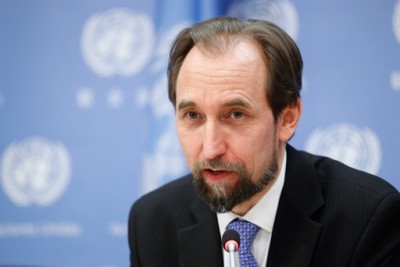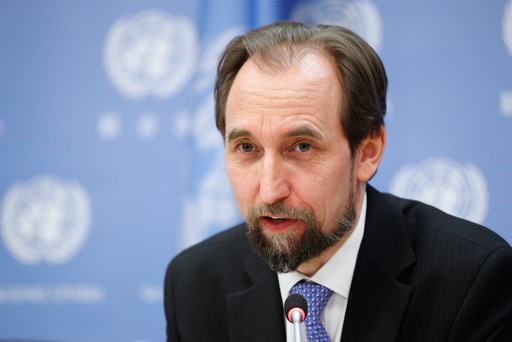 The United Nations’ top human rights official called on the Muslim world to denounce the “monstrous” crimes of the extremist group that seeks to establish an Islamic state in Iraq and Syria, calling its actions both a violation of international law and Islamic tenets.
The United Nations’ top human rights official called on the Muslim world to denounce the “monstrous” crimes of the extremist group that seeks to establish an Islamic state in Iraq and Syria, calling its actions both a violation of international law and Islamic tenets.
Zeid Ra’ad Al Hussein, a member of the Jordanian royal family and the first Muslim to be named high commissioner for human rights, on Tuesday urged the Security Council to back efforts to overturn the Islamic State’s “ideology of violence.”
His speech was equally a message to the Muslim world.
“It is also disturbing how few to nonexistent have been the public demonstrations of anger in the Arab and Muslims worlds over the crimes being perpetrated in Iraq — notwithstanding the clear condemnation by many Arab and Islamic governments,” Mr. Al Hussein said.
Citing the opinion of Muslim clerics, he said the group had violated Shariahin many instances, through conversions, the reintroduction of slavery and the killing of civilians. He said Islam also prohibited the killing of diplomats and emissaries, which could be extended to journalists and aid workers.
His comments come as an American-led coalition expands military action against Islamic State strongholds in Iraq and Syria, but has so far been unable to stop its killing rampage. On Sunday, the Islamic State announced the beheading of an American, Peter Kassig.
On Wednesday, the Security Council is scheduled to discuss how to increase international cooperation against the Islamic State. It has already passed a measure calling on countries around the world to stop the flow of money and fighters to banned terrorist groups. A United Nations panel of experts recommended that the council crack down on the ability of the Islamic State to collect oil revenues by requiring countries to seize oil coming from Islamic State territory.
Separately, the United Nations envoy to Iraq, Nickolay E. Mladenov, said the efforts of the new Iraqi government and the American-led airstrikes were yielding some results. The bombings had destroyed some of the insurgents’ infrastructure and kept them from gaining new territory.
Mr. Mladenov said there were reports that their funds were dwindling and they were being forced to cut rations and salaries to their fighters.
Most important, he said, he was no more worried about the prospect of Iraq’s disintegration, as he had been just some months ago. “We are not looking at a collapse of Iraqi state. We’ve turned the tide,” he said.
Iraq, however, has paid a heavy price already. Since the beginning of the year, he said, 10,000 civilians have been killed and 20,000 injured.
Mr. Al Hussein, the high commissioner for human rights, said his office was also investigating the actions of the Iraqi authorities and pro-government Shia militias.
He went on to say that his office had concluded that the Islamic State had most likely violated three of five offenses that are listed under crime of genocide. He urged Iraq to consider acceding to the treaty that created the International Criminal Court and at least accept the court’s jurisdiction over possible international crimes committed in “the current situation.”
Asked about the prospects of Iraq joining the International Criminal Court, Mr. Mladenov said he, too, had encouraged the government to consider it. “This has not been overruled by the Iraqis,” he said, “but it needs to be discussed at greater length.”
NY Times


Leave a Reply
You must be logged in to post a comment.